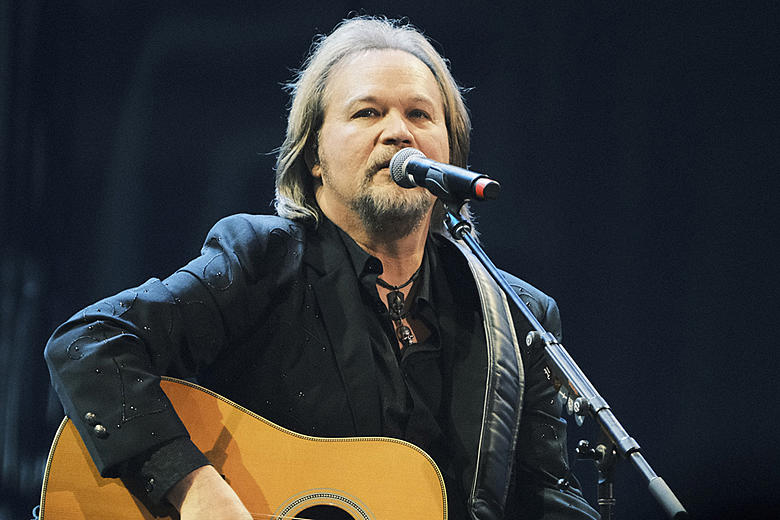
A familiar refrain made new—Travis Tritt takes “Take It Easy” and turns it into a letter to the years we’ve all lived through.
The essentials first: Travis Tritt’s version of “Take It Easy” was released as a single in 1994, lifted from the all-star tribute Common Thread: The Songs of the Eagles (1993), a charity album benefiting Don Henley’s Walden Woods Project. Tritt’s cover climbed to No. 21 on Billboard’s Hot Country Songs in the U.S. and No. 12 on Canada’s RPM Country Tracks, a respectable chart run for a reverent remake that carried more cultural weight than its peak might suggest.
Here’s the part that turns an enjoyable cover into a hinge moment in rock history. When Tritt agreed to cut a video for the single, he set one condition: the Eagles had to appear in it. Against the odds, all five members from the classic late-’70s lineup showed up on December 6, 1993, sharing a pool table, some instruments, and—most importantly—room to talk after years apart. That easy afternoon thawed a long freeze; within a couple of months, plans for a reunion took shape, culminating in 1994’s Hell Freezes Over album and tour. It’s no exaggeration to say Tritt’s clip helped nudge one of America’s great bands back onto the road.
Musically, Tritt doesn’t try to out-Eagles the Eagles. He leans into his strengths—a warm, road-worn baritone and the sturdy swing of early-’90s Nashville—guided by producer James Stroud. Where the 1972 original danced on Glyn Johns’ gleaming harmonies and that famous double-time banjo, Tritt’s take replaces Bernie Leadon’s twang with muscular guitar figures by Dann Huff, shifting the song’s center of gravity slightly from California canyon breeze to Southern blacktop heat. The melody remains a smile in the mind, but the textures are thicker, more oak than cedar, the beat a touch heavier—perfect for turning the ignition before sunrise.
For those of us who’ve logged a few more miles, the lyric lands differently now. “Take it easy” isn’t just a hippie shrug; it’s a seasoned discipline. When you’re twenty-five, that line is permission to chase the next horizon. By sixty-five, it’s a reminder to loosen your grip on the wheel, to breathe through the detours—work that didn’t pan out, friendships that needed time to find their way back, roads you never planned to take. Tritt sings it like a man who’s had to practice the advice he’s offering. There’s a touch more gravel in the vowels, a patience in the phrasing. You hear not just the thrill of the open road, but the quiet blessing of pulling off at the right exit and letting the sunset do the talking.
And yet the song’s core meaning is unchanged. Written by Jackson Browne and Glenn Frey, “Take It Easy” was always a gentle antidote to hurry—a postcard from Winslow (and Flagstaff) that reminds you not to let the “sound of your own wheels” drive you crazy. When the Eagles first released it in 1972, it became both a signature and a signpost—No. 12 on the Billboard Hot 100 and the breezy calling card of a new West Coast blend of harmony, steel, and sun-faded denim. Producer Glyn Johns famously punched up the arrangement with a flash of banjo, giving the track its country-rock lift and defining an era’s sound. Tritt’s cover tips its hat to that lineage even as it interprets the tune through a country lens three decades on.
The tribute album that carried Tritt’s single—Common Thread: The Songs of the Eagles—mattered in its own right. Dreamed up as a benefit for the Walden Woods Project, it gathered Nashville’s ’90s A-list to repay a musical debt to the band that had quietly mentored them from afar. Tritt’s cut opened the record, and in hindsight it did something albums rarely do anymore: it changed the future. Not just of one singer’s discography, but of the Eagles themselves. There’s poetry in that—how a song about taking things slow became the unlikely spark for a longed-for reunion, proof that sometimes the shortest distance between estranged friends is a three-minute chorus everyone knows by heart.
So when you cue up Travis Tritt — “Take It Easy”, don’t just hear a respectful cover. Hear a bridge between generations of American music; hear a room where old friends remembered why they sang together; hear your own open roads, the ones you’ve driven and the ones you decided not to. The advice still holds, maybe now more than ever: ease up, look around, and let the song carry you a few miles farther than you planned.